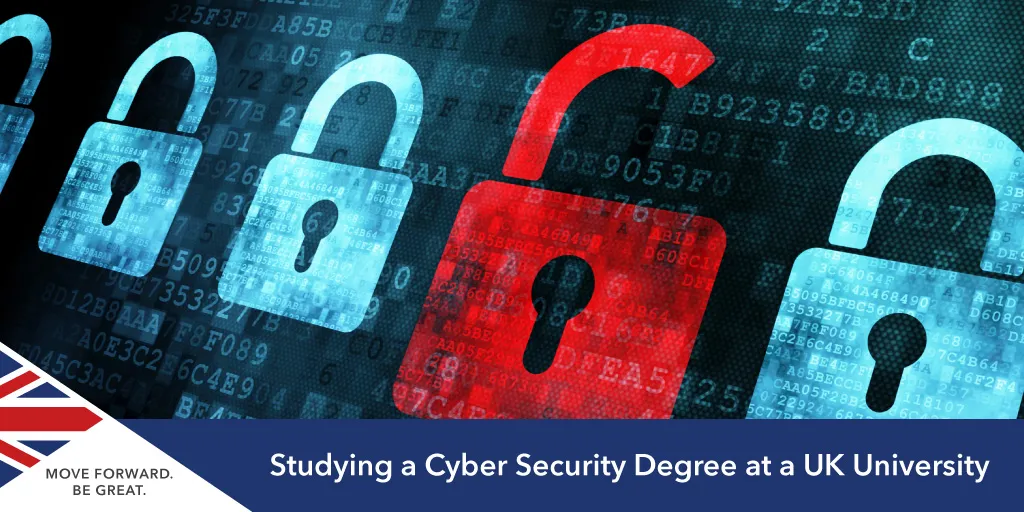Cyber security, also known as computer security or IT security, is a specialised study in protecting information and data from theft or damage to hardware or software. With so much essential data stored in every system, there's a constant need to protect it from any harm, or else it could disrupt the business.
Cybercrime is one of the biggest threats governments, businesses, and consumers face in the 21st century. As attackers become more inventive and online threats evolve, the government and companies increasingly seek cyber security experts to secure their systems from cybercriminals. The number of jobs in cyber security has doubled in the last four years and makes an excellent career choice. Undergraduates with computer science and information technology degrees can pursue a master's degree in Cyber Security.
Learn about the best programmes for studying cyber security in the UK below (Guardian University Guide) or arrange your free consultation with SI-UK India today.
Top UK Universities for a Master's in Cyber Security
1. Lancaster University
Lancaster University's MSci Hons. in Cyber Security with Industrial Experience is the best cyber security programme in the UK and will teach you all about keeping computer systems safe. In the second year, you'll dive deeper into cyber security and computer science. You'll learn about things like secret codes (cryptography) and how to protect computer networks.
Throughout the programme, you'll get hands-on experience and learn from the School of Computing and Communications experts. This programme prepares you for a career in keeping our digital world safe.
- Suggested course: Cyber Security (with Industrial Experience) MSci Hons
- Entry requirements: A Level AAA. International Baccalaureate 36 points overall with 16 points from the best 3 Higher Level subjects.
- International fees: £28,675
2. University of Southampton
The University of Southampton's Computer Science with Cyber Security (MEng) prepares you to defend companies and governments from cybercrime. With a global shortage of cyber security experts, your skills will be in high demand after graduation.
During the programme, you'll learn how to create software and systems, study in computer science labs known for their excellence in cyber security research, discover how to find and fix cyber security problems in software and devices, and, upon graduation, get certified by the British Computer Society and the National Cyber Security Centre, making you a sought-after professional in this important field.
- Suggested course: Computer Science with Cyber Security (MEng)
- Entry requirements: A*AA or AAAA, including mathematics (minimum grade A). Alternatively, A*A*B, including mathematics (minimum grade A*). IB Diploma 38 points.
- International fees: £27,400
3. University of York
The University of York's MEng (Hons) Computer Science with Cyber Security teaches you how to protect computers and data from bad actors. It covers various techniques, rules, and tools to keep the digital world safe. You'll start with a strong foundation in computer science, learning things like coding and math. Then, you'll dive deeper into cyber security, exploring topics like secure systems and encryption. The knowledge gained will prepare you for a career in cyber security or related fields.
You can even choose an extended version of this programme with a year of industry experience. Plus, it's accredited by BCS, the Chartered Institute for IT.
- Suggested course: MEng (Hons) Computer Science with Cyber Security
- Entry requirements: A levels A*AA including Mathematics. IB - 37 points overall, including grade 6 in Higher Level Mathematics.
- International fees: £28,800
4. Leeds Beckett University
Leeds Beckett University's MEng (Hons) Cyber Security & Digital Forensics equips you with skills in two crucial areas: digital forensics and cyber security. In this course, you'll learn how to analyse digital devices like hard drives to uncover evidence, and you'll also discover how to protect businesses and users from cyberattacks.
During the extra year of study to earn your master's degree, you'll delve into advanced topics like image and video forensic investigations and software security. You'll gain hands-on experience with industry tools and have opportunities to network with professionals. The university's collaboration with the police offers real-world insights into cybercrime.
- Suggested course: MEng (Hons) Cyber Security & Digital Forensics
- Entry requirements: GCSE English Language and Maths at Grade 4 or above (Grade C for GCSEs taken before 2017) or equivalent. UCAS Tariff Points: 128 points are required.
- International fees: £16,000
5. City, University of London
At City, University of London, the Computer Science with Cyber Security MSci (Hons) is a four-year degree where you'll first learn how computers and software work. Then, you'll specialise in cyber security. You'll gain skills in analysing, designing, and programming software. Later, you'll study topics like encryption, cybercrime, and digital forensics. You'll become an ethical hacker, finding computer system and network weaknesses and investigating attacks.
In your fourth year, you'll learn alongside top researchers and gain expertise in programming languages and cutting-edge game programming techniques. This degree also prepares you for a career in engineering and offers practical work experience opportunities.
- Suggested course: Computer Science with Cyber Security MSci (Hons)
- Entry requirements: A-level: ABB (Computer Science, Maths, or other science preferred). IB: 31 points, including 5 in Mathematics at a Higher or Standard Level.
- International fees: £20,080
6. Bucks New University
Bucks New University's MSci (Hons) Cyber Security, designed by industry experts, prepares you for the fast-paced world of cyber security. In the first year, you'll learn the basics of computing and security, including networking and cyber threat management.
The second year dives deeper into topics like database design and software engineering. Year three explores AI, quality assurance, and security auditing. In your final year, you choose what interests you most, like risk management or cloud security. This integrated master's offers financial benefits and sets you apart in the competitive job market, as employers value the advanced skills it provides.
- Suggested course: MSci (Hons) Cyber Security
- Entry requirements: A typical offer will require a UCAS tariff score of 88 - 112. A minimum of two full A-levels (or equivalent) is required.
- International fees: £15,000
7. Coventry University
Coventry University's MSc (Hons) in Ethical Hacking and Cyber Security helps you become skilled in understanding hackers, their methods, and how to defend against them. You'll learn to investigate computers and networks for digital evidence, which can be used in legal cases or incident responses. You'll also understand how network infrastructure affects security.
In the first year, you'll get a broad foundation in the subject. Year two continues to build on your skills, and there's an optional placement year. Year three prepares you for the working world, and you can work on a project you're passionate about. If eligible, you can also opt for a fourth-year master's to deepen your expertise.
- Suggested course: MSc (Hons) Ethical Hacking and Cyber Security
- Entry requirements: A-level: ABB to include one from Mathematics, Physics, Chemistry, Further Mathematics, Computer Science, Computing or Design Technology. IB - 31 points.
- International fees: £19,850
8. University of Nottingham
At the University of Nottingham, the Computer Science with Cyber Physical Systems MSci prepares you for creating future computer systems. During the course, you'll work on group projects with companies like Capital One and IBM, boosting your CV and networking opportunities.
You'll learn computer basics, programming, and math in year one. Year two covers topics like algorithms, software development, and cyber physical systems. In year three, you'll dive into computer security, machine learning, and ethics. Year four offers specialised robotics, cyber security trends, and advanced networking courses. You can also gain real-world experience through industrial placements and projects.
- Suggested course: Computer Science with Cyber Physical Systems MSci
- Entry requirements: A*AA (AAA if you have an A in computer science/computing). IB Score: 38, 5 in maths at Standard/Higher Level or GCSE.
- International fees: £28,600
9. University of the West of Scotland
The University of the West of Scotland's MEng (Hons) Cyber Security is designed to teach you how to safeguard modern data systems. You'll gain industry-relevant skills, including ethical hacking, networking (CCNA), and programming. In an era where our security and prosperity rely heavily on digital technology, protecting against cyber threats is vital.
This programme addresses the growing demand for professionals in this field, as recognised by the Scottish and UK Governments. Graduates can pursue roles like Chief Security Engineer (CSE) or Chief Security Officer (CSO) in sectors such as healthcare, finance, and public security organisations, where cyber security expertise is crucial.
- Suggested course: MEng (Hons) Cyber Security
- Entry requirements: A Levels: BBC (112 UCAS Tariff points) including Maths, Physics, and GCSE English. International Baccalaureate: 32 points, including Maths, Physics, and SL English.
- International fees: £18,000
10. University of Greenwich
The MEng Cybernetics programme at the University of Greenwich combines Bachelor's and Master's studies. It focuses on cybernetics, covering topics like the Internet of Things and smart devices. You'll learn engineering fundamentals and specialise in artificial intelligence and user-centred design.
In the final year, you'll work on a master 's-level project, enhancing teamwork and leadership skills. Graduates can pursue technology, engineering, and computing careers, especially in emerging tech. Some even start their own companies. The curriculum includes engineering principles, electrical circuits, sensors, networks, and advanced electronic system design.
- Suggested course: MEng Cybernetics
- Entry requirements: Typical UCAS points for Clearing entry: 80
- International fees: £16,150
Study a Master's in Cyber Security in the UK
If you want to study for a master's in cyber security in the UK, arrange your free consultation with SI-UK today.
FAQs
2 out of the top 10 universities in the world for studying computer science and information systems are in the UK, according to the QS World University Rankings by Subject, showing it is a leading country in studying this unique subject.
39% of firms in the UK have been subjected to cyber attacks over the last two years, and as more businesses choose online modes of business, cyber security is in demand in the UK and worldwide.
For entry-level jobs, coding skills are not a prerequisite for a qualified cyber security professional.
To get a job in cyber security in the UK, candidates must have at least an undergraduate degree in computer science. IT professionals with adequate experience can also get a job in cyber security.
A bachelor's degree in computer science is the minimum requirement to get a job in cyber security in the UK.
















 I sincerely thank SI-UK for getting me accepted to UCL. The MSc in Urban Development and Planning is extremely competitive, but the right guidance provided by SI-UK made my dream of studying at University College London a reality. The services were exceptional from beginning to end.
I sincerely thank SI-UK for getting me accepted to UCL. The MSc in Urban Development and Planning is extremely competitive, but the right guidance provided by SI-UK made my dream of studying at University College London a reality. The services were exceptional from beginning to end. 

